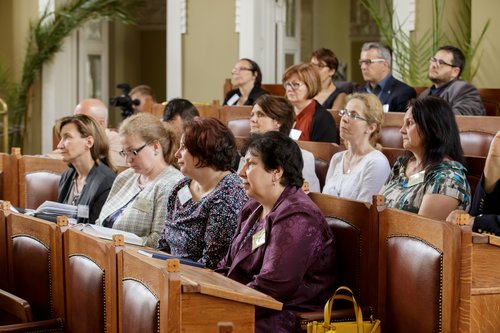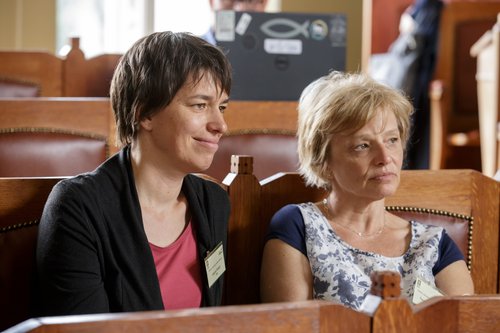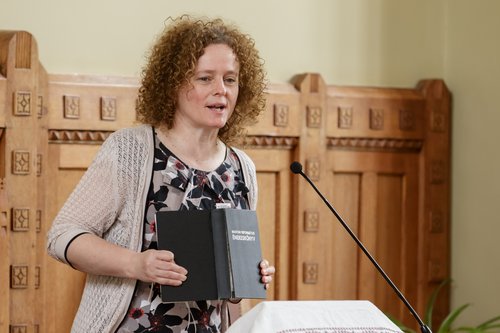God’s Kingdom Visible in Education
2018. május 30., szerdaColleagues of the Reformed Church in Hungary’s Roma Mission and HEKS-RCH joint project organized a workshop on the Inclusive Reformed Primary Schools at the Synod Office. The participants learned about the position of Hungarian primary education institutions regarding inclusion, discussed the topic during a roundtable session, and shared their practical experiences of the Inclusion Index.
"Through Creation, the redemption by Jesus Christ is valid for all," said Eszter Dani, head of the Mission Department of the Reformed Church in Hungary (RCH), in her open reflection added that the resources of God's kingdom also provide support in the most hopeless of situations. In this hope, the Inclusive Schools Workshop is the beginning of the journey: HEKS (the aid organization of the Swiss Protestant Churches), which has been cooperating with the RCH for five years, has just recently launched the school program in Reformed primary schools in the four-year Country Program.
The Country Program (CP) is a joint project between the Reformed Church in Hungary and HEKS on refugee and Roma integration, running from 2017-2020. The focus of the project is on disadvantaged groups, with efforts to improve relationships between the majority and the Roma and refugee minority. The project for the promotion of integration of Roma and refugees centers on the sensitization of the church constituency and involves congregations.
Angela Elmiger, the representative of HEKS in Central and Eastern Europe, explained the history of cooperation and the process in creating the program: "HEKS knew little about the primary schools of the RCH in terms of inclusion, so we asked experts to carry out research on school inclusion, focusing on what the schools are doing, and what is needed for the schools to continue in this regard."
The participants of the workshop were greeted by Tibor Ábrám, the lay president of the Cistibiscan Reformed Church District and the director of the Lévay József Reformed High School in Miskolc. He emphasized inclusion as a commitment of Reformed education, adding that the advantage of Christian pedagogy is based on the knowledge of the source of inclusion.
The guests gained insight on the research on inclusion in Reformed primary schools in Hungary, in a presentation from Eszter Neumann, one of the two members of the Center of Education and Youth Research and Further Training of the Faculty of Social Sciences of Eötvös Loránd University.

The main objectives of the survey were to assess the situation of the Roma and disadvantaged students in Reformed primary schools, explore the unique challenges and needs of Roma and disadvantaged students in schools, promote common thinking about themes, and provide strategic planning support for the general preparation of the HEKS-RCH school program.
As 89% of the institutions participating in the survey responded to the questions asked, results are considered absolutely representative – aside from the questionnaire, the researchers conducted four separate case studies. According to the feedback, the highest proportion of disadvantaged and Roma students is in the Cistibiscan Reformed Church District, and the most vulnerable of these students live in the Transtibiscan Reformed Church District.
One important conclusion of the research was: the fewer the primary schools in a settlement there are, the greater the proportion of Roma children in Reformed primary schools. The institutions presume that expectations of parents include a disciplinary, systematic, and respectful school environment as important factors, however Roma parents prefer the school because it is close to their homes – the importance of the school’s denomination is significantly lower in Roma communities than the majority of the parents generally.
In the responding institutions, innovative pedagogical methods (group work, paired work, differentiation) have spread, but there is no Roma minority education anywhere, and the presence of Roma minority content is not at all characteristic in the curriculum. As far as the professional staff is concerned, schools need pedagogical assistance, therapeutic and development pedagogues, and school psychologists. It became apparent that the attendance of school pastors is also very important, but they cannot substitute the work of school psychologists.

In Eszter Neumann's summary, she outlined steps that could be taken to reach more inclusive schools, for example: clear, strategic positioning and communication would be needed on the importance of Roma inclusion at the level of those who maintain the schools (congregation, Presbyteries, or the Synod). In addition, further training, networking, launching of mentoring programs, and symbolic recognition of Reformed schools and teachers successful in compensation of disadvantages would be an important element of promoting inclusion.
Targeted institution development would also help schools to become more receptive where the rate of Roma and disadvantaged students are above 10-15%. Furthermore, implementation of pilot programs and sensitization of secondary schools are also essential.
The workshop continued with a roundtable discussion moderated by Pál Szontágh, director of the Reformed Pedagogical Institute. One of the participants, Levente Sohajda, a pastor in the villages of Göncruszka, Vilmány and Hejce, said: "We need to ask: how can we become a school of the poor today? Our education only reaches its goal if the kingdom of God is visible in it.” Zsolt Gál, deputy director of the Nagyharsány Primary School of the Reformed College of Pécs, added: “The Christian school's main foundation is the love of children, which is also the foundation of inclusion.”
The aforementioned researcher, Eszter Neumann, shared one of the main features of effective work-based educational institutions: “A good school has a vision of what society wants to see in the future. It knows what the situation is like now and how the local community should work.” Dr. Erika Kopp, lecturer at Eötvös Loránd University’s Faculty of Pedagogical and Psychological, said in response to this: “Church schools contribute to the compensation of disadvantages in general. Where it is necessary, teachers need to have the inclusive view first.”

The afternoon program of the workshop was led by Dr. Ferenc Arató, assistant professor at the Institute of Pedagogy at the University of Pécs, who introduced “Inclusion Index in Practice.” The Index itself connects different indicators to different value dimensions; put simply, it measures how inclusive a school is. The participants in this regard have analyzed core values of inclusive education, such as respect for rights, non-violence, love, and diversity – here practical experiences were shared as well as personal opinions.
The HEKS-RCH school program continues with five schools in September with a one-year pilot project where participating institutions set up an “action plan,” which will include expected changes on a regular basis.
Attila Dezső
Photos: Vargosz
Edited: Priscilla Yang
Contact us
Click here if you are interested in twinning.
Reformed Church in Hungary
Address: H-1146 Budapest, Abonyi utca 21.
PO Box: 1140 Budapest 70, Pf. 5
Email: oikumene@reformatus.hu
English, German and Korean language services in Budapest
Links
Recommended articles
-
Pastoral Letter in the Light of the Pandemic
Bishop Dr. István Szabó sent a pastoral letter of encouragement to the ministers serving in RCH’s congregations, expressing his gratitude for the persistence and creativity of the pastors.
-
RCH Joins in Pope's Call for Prayer
RCH published the call on congregations to join the initiative of Pope Francis, supported by ecumenical organisations, to unite in praying the Lord’s Prayer on Wednesday, 25 March, at noon.
-
English Speaking Worship Services Online
Each Sunday at 11 AM (CET) the St. Columba's Church of Scotland in Budapest, the international community of RCH invites you to join the worpship service on its facebook page.
-
Test of Humanity and Companionship
Reformatus.hu asked Dr. György Velkey, Director General of the Bethesda Children’s Hospital of RCH about the challenges of health care workers and ways of prevention against the pandemic.
-
All Church Events Suspended
In light of the coronavirus the Presidium of RCH requested congregations to suspend all church events with immediate effect. Beside restrictions, it calls for prayer, sobriety and responsibility.











